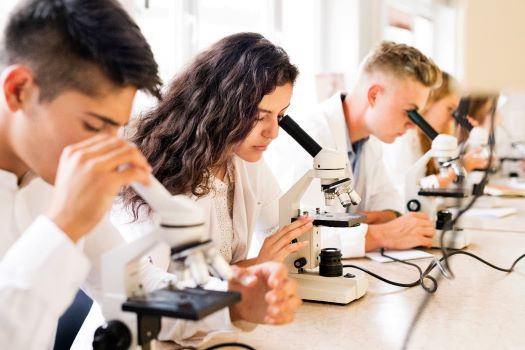
IB Chemistry Tuition Program Structure
Our program supports both IB HL Chemistry tuition and IB SL Chemistry tuition with structured lesson plans.
SL Chemistry Tuition
- Focus on core syllabus topics like Atomic Structure, Bonding, Acids & Bases, Energetics.
- Training for short-answer and data-response questions.
- Building strong foundations for Paper 1 & Paper 2.
HL Chemistry Tuition
- Covers advanced HL topics: Kinetics, Transition Metals, Organic Reaction Mechanisms.
- Emphasis on problem-solving and multi-step questions.
- Intensive drills for Paper 3 data-based questions and lab skills.
IA & EE Support
- Coaching on selecting suitable IA and EE topics.
- Guidance for lab work, data processing, and evaluation.
- Structured feedback to help maximize coursework scores.
| Structure 1.1 | Introduction to particulate nature of matter | 2 | 2 |
| Structure 1.2 & 1.3 | The nuclear atom & Electronic configuration | 5 | 8 |
| Structure 1.4, 1.5 & Reactivity 2.1 | Stoichiometry | 17 | 17 |
| Structure 2 | Chemical Bonding | 18 | 28 |
| Structure 3.1 | The Periodic Table & Transition Elements | 7 | 11 |
| Reactivity 1 | Energetics | 12 | 22 |
| Reactivity 2.2 | Kinetics | 9 | 15 |
| Reactivity 2.3 | Equilibrium | 5 | 9 |
| Reactivity 3.1 | Proton transfer reactions – Acids and Bases | 8 | 17 |
| Reactivity 3.2 | Electron transfer reactions – Redox & Electrochemistry | 10 | 15 |
| Structure 3.2, Reactivity 3.3 & 3.4 | Organic Chemistry | 10 | 14 |
| Structure 3.2 | Analytical Chemistry - Spectroscopy | 0 | 9 |
| Skills | Measurement & Data Processing | 2 | 2 |
| IA Guidance | 5 | 5 |
Why Choose Focus Chemistry for IB Chemistry Tuition
- Specialist IB Chemistry Tutors – Experienced in HL and SL syllabi.
- Proven Track Record – Over 90% of our students improve 2–3 grade bands, many achieving 6 or 7.
- Small Class Sizes – Focused attention with real-time feedback.
- Flexible Learning Options – Attend lessons at Balmoral Plaza or online with full notes and recordings.





